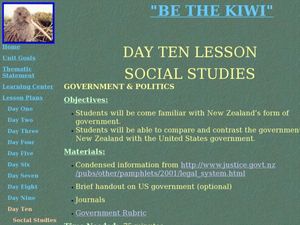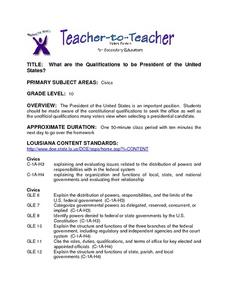Curated OER
Documents and Symbols and American Freedom
Students complete a unit of lessons on the documents, symbols, and famous people involved in the founding of the U.S. government. They create a personal bill of rights, write a found poem, design a flag, conduct research, and role-play...
Curated OER
LEGISLATIVE BRANCH
In this U.S. branches of government learning exercise, students respond to 15 fill in the blank questions regarding the powers of the legislative branch of government.
Curated OER
The Judicial Branch
In this checks and balances in U.S. government worksheet, learners read a 4-paragraph selection regarding the Supreme Court and then respond to 5 fill in the blank questions.
Curated OER
Government 13.1 and 13.2
In this government worksheet, students answer 10 fill in the blank questions and 10 short answer questions regarding presidential powers.
Curated OER
Utah's Legislative Branch: How a Bill Becomes a Law
Seventh graders discover how a bill becomes a law in Utah. In groups, they decide on a law they would like to see enacted and discuss its chances of being passed by the legislative branch in Utah. They hold elections in which each...
Curated OER
Three Branches of Government
Fourth graders listen to a lecture about the government of Indiana, and the three branches of government. They discuss the reasons for the three branches and read from their text the information on government. Students play a game to...
Curated OER
Constitutional Issues: Watergate and the Constitution
Students take and defend positions on what conditions contribute to the establishment and maintenance of a constitutional government. They debate whether or not the government should have prosecuted Nixon over the Watergate scandal.
Curated OER
Follow the Leader
Students examine the roles of national leaders and the three branches of government and their duties. They view and discuss the images on the South Dakota Quarter Reverse transparency, complete a worksheet, and create a mobile of the...
Curated OER
Separation of Powers
Students examine the separation of powers in local and federal government. Using case studies, they review several instances of separation of powers. After reading the case studies, they write a brief opinion essays supporting their...
Curated OER
A More Perfect Union
Fourth graders complete a unit of lessons on the development of the U.S. government. They examine the main ideas of the Declaration of Independence, develop a class translation of the preamble to the Constitution, create a flow chart,...
Curated OER
Teaching Six Big Ideas in the Constitution
Young scholars debate the constitutional principles of the United States. In this U.S. government lesson, students examine the meaning of the text of the U.S. Constitution and analyze other primary documents of the era. Young scholars...
Curated OER
Bill Of Rights
Students examine Supreme Court cases. In this U.S. government lesson, students watch a video about the Bill of Rights and then research 4 Supreme Court cases using the noted web site. Students analyze the presented information and write...
Curated OER
Enforcers of the Law, The Executive Branch
Fourth graders explore the executive branch of government; in particular, Florida's executive branch of government.
Curated OER
Branches of Government
Students participate in a sorting activity to research and categorize the three branches of government. They listen to teacher read aloud and write questions for a game based activity
Curated OER
Be the Kiwi: Government and Politics in New Zealand
Students examine the structure of government in New Zealand. In this government instructional activity, students listen their instructor present information about the government in New Zealand then create diagrams that compare its...
Curated OER
Democracies in North America: Canada, the United States, and Mexico
Pupils examine democratic values. In this democracy activity, students research the political systems of Canada, Mexico, and the United States in order to compare and contrast them. Pupils also discuss domestic and international events...
Curated OER
What are the Qualifications to be President of the United States?
Learners research the qualifications necessary to be the president of the United States. They create a want-ad for this position using what they have learned about the qualifications.
C-SPAN
Supreme Court Justices Research and Resumes
According to Article III, Section1 of the United States constitution, the only qualification one needs to be appointed to the Supreme Court is to demonstrate "good behavior." The president and Congress are given the power to determine...
Carolina K-12
Principles of the US Constitution
After breaking into groups according to major principles of government (i.e., popular sovereignty, separation of powers, checks and balances, etc.) in the United States, your class members will produce public service announcements...
National Endowment for the Humanities
Lesson 2 James Madison: The Second National Bank—Powers Not Specified in the Constitution
How much power is too much power for the federal government? Scholars use primary documents and constitutional research in groups to analyze the creation of the Second National Bank under James Madison. This is the second lesson of a...
Teaching Tolerance
Why Local Elections Matter
Uncle Sam wants everyone to vote in local elections! Geared toward middle and high school scholars, the resource explores voter turnout and the importance of local elections. Academics participate in group discussion, complete...
PBS
Analyzing McCulloch v. Maryland
What happened in the Supreme Court case of McCulloch v. Maryland? The resource teaches the specifics of the case with a video and provided discussion questions covering issues such as precedent and the Supreme Court as an equal branch of...
Curated OER
Charting the Three Branches of Government
Learners review CongressLink on the internet and study the branches of government. They work in groups to create charts showing the structure and functions of the three branches of government as outlined in the first three articles to...

























